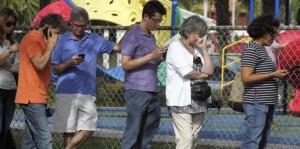
The Latino vote in Florida and the doughnut theory
(Speech given by Alvaro Fernandez during the event Cuba-U.S. relations during Obama’s 2nd term: “The Cuban American Community and changes in Cuba. Building bridges for better relations,” held in Miami last Saturday, March 15.)
Good afternoon. My name is Alvaro Fernandez. For those who do not know me, I publish a bilingual internet publication whose name is Progreso Weekly and Semanal. Today I am here wearing another hat, though. For the past 14 years I have dedicated part of my life to registering voters – I have worked mostly in Florida, but also in places as far away as California and Texas, and also Georgia, North Carolina and Virginia. Over this period of time my efforts and projects have been responsible for registering more than 150,000 voters – a great number of those Latinos.
But let me begin with a brief story.
In September 2000, I had dinner with a man and woman visiting Florida for the first time. They had been to Tampa, Orlando, Palm Beach, Broward, and ended their tour in Miami.
The two persons I was meeting with that night – he was from Los Angeles, she lived in San Antonio. They were president and vice president of an organization whose mission was to register Hispanics and then get them to vote. The organization had been doing this, successfully around the country, for 25 years at the time. They had never worked in Florida.
Their message: We can teach you how to win elections. They also said something I found even more interesting. HE said, Latinos in Florida (aside from Cubans) will become a very important voting bloc in the years to come. Sooner than you think…
They agreed with our wish of changing Cuba policy in Washington. They also understood that Cuba policy was hashed out in the streets of Miami.
He told me: “You are going about it the wrong way. You’re going straight at them.” At this point in time, he said, they are much better organized than you are, and have a majority. You need help.
He proposed building a wall around them. He called it his doughnut theory. It’s actually very simple. Register other voters, new voters, more attuned to your politics. And slowly but surely surround them and squeeze them to the point that they become less and less important, and at times even obsolete.

About three days later, I began what we called the Florida Latino Vote Project. It was probably the first organized incursion into untapped territory in this state – Hispanic votes (other than Cubans).
The two individuals were from Southwest Voter Registration Education Project, where I worked for about nine years. What followed in the first decade of the 21st century here in Florida has now been well documented. I feel I played a tiny role in this political growth we are seeing the results of now …
And I will give you an idea of the work that has been done since that meal at, of all places, Versailles Restaurant… In the year 2000, there were approximately 796,249 registered Latino voters in Florida. Most were Cubans. In 2012, before the presidential election, the number had risen to 1,660,074. A growth in 12 years of 108%. And Cubans are no longer the majority of voters, among the Hispanic community. Other Latino communities together outnumber Cuban registered voters. And all indications point to the fact that by 2016, there will be more Puerto Ricans registered to vote in Florida than Cubans.
Can you understand why there are a group of individuals in this state and around the U.S. worried about what’s happening when it comes to who is voting, and who is registering to vote.
I’ll give you a couple of other interesting numbers. I mentioned the 108% growth in voters among Latinos. In what the census calls the while community, the growth from 2000 to 2012 was 17%. The black community, which I do not want to leave out, the voter growth there: 73%.
So quickly, let’s look at the numbers again: 108% growth among Latinos, 73% among blacks … and 17% growth in voters registered among the white community. I hope this helps you understand why our governor’s eyes bulge when he discusses voter registration in Florida. And it is also a reason why Rick Scott and others like Rick Scott have tried (and succeeded in some cases) in making it more difficult for persons to register to vote, and then to vote. Especially if you are black, Latino or poor.
But let me finish my numbers portion with something that worries them even more and gives them more reason to prevent voters from voting. In Florida, growth in the general population (and now I am not talking about voters, but potential voters down the line) is as follows: the growth among Hispanics is 57%, among blacks it’s 28% and in the white population it is 13%.
In the Orlando area alone, for example, there are currently more than 160,000 young Puerto Ricans close to turning 18-years-old…
Look, I can give you numbers and many more facts and figures which point to what will happen and what has happened. But I won’t bore you…
My exit from SVREP in 2009 did not stop me from doing voter registration. I had seen the results of the work put in. I decided then to create our own non-partisan organization here in South Florida dedicated to just that – registering new voters. We named it Miami Progressive Project, we call it MPP.
Our work does not stop at the registering of voters. We follow them and make sure they vote. But there’s more to the work. Our hope is to also create our future leaders. Persons who have worked the political system from the ground up. People who understand who our voters are. Their needs. Their aspirations.
And I am happy to report that in 2012 Miami-Dade elected one of the first persons to come out of our ranks. Because, and this is important, we can help to elect the president, the governor, but as important to all of us, maybe more important to most of us, are positions in government that we don’t get the voter participation that they require – state legislature, city councils and commissions, the school board and so on.
At the same time, less participation by voters (a sad reality) makes it easier for us to elect our own candidates. That’s if we continue to produce new voters – who vote!
Let me conclude by assuring you that we have been successful. All of us here in this room can be proud of our success. If there are any doubters out there, take a look at the recently released Atlantic Council poll.
But folks we’ve just skimmed the surface. There is so much more work to be done. We are on the brink of changing things forever. It will be a positive change for everyone involved – even for those who oppose us, believe it or not.
In my case specifically, my missions are two-fold going forward. Like I mentioned at the beginning, I will continue reporting and commenting the news through Progreso Weekly. But I will never stop setting up projects to register new voters.
It is the best way I know, in this system we live in, with all its good and the bad, to change the things we feel need changing. And let me warn you, thing will not get any easier. In fact, they WILL continue to make them harder. The numbers I shared with you earlier should assure us of that.
But the tide has changed and it’s rolling forward. The only ones who can stop it are us. And that’s by celebrating our accomplishments, becoming lazy and then doing little or nothing from here on in.
Like I mentioned, my job is to register new voters. And I would not be fair to myself if I did not mention this – the work of voter registration requires: first, money, second, more money, then know-how, persistence and a plan. Volunteerism helps, I am not criticizing it, but more than volunteers are needed. We need what I will call an army of workers.
Look I will leave you with this thought. Some of us think the idea of change in Cuba policy here in the U.S. is almost impossible. And when I mention change I mean real change, not a tweak here and there over the years, and depending on the president that resides in the White House.
I believe anything is possible. And that belief comes from the same place that inspired me to support a young senator from Illinois I saw speak during Democratic Party Convention of 2004.
I will never forget speaking to one of my closest friends back then, someone I respected greatly, who turned to me and said: “Alvaro, this country is not ready to elect a black president.”
Thank you.


